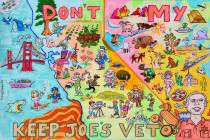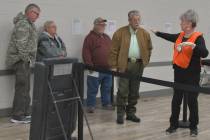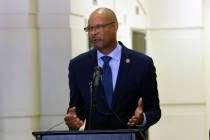Showdown over land civilized–so far
Not a shot was fired, not a voice was raised. And there was no sign of rogue rancher Cliven Bundy. Nor were the Koch brothers burned in effigy.
You'll have to ride the range a long time to find a more qualified panel to discuss the complexities of public land use than the group Black Mountain Institute recently gathered under the title, "This Land Is Your Land ... Or Is It?" What surely surprised some in the audience at UNLV was the civility of the conversation.
This is Nevada, where 86 percent of the land is controlled by the federal government. Who should steward public lands has been a question since before Nevada's statehood, and indeed is directly tied to it. Through the years Nevadans, ranchers mostly, have tested the fences of the federal government's ability and legal right to control so much of the Silver State.
But no one shouted about the "Sagebrush Rebellion" at the Sept. 24 panel at UNLV's Cohen Theatre.
Maybe the presence of the great American environmental poet Gary Snyder, the "poet laureate of deep ecology," had something to do with it. Perhaps it was the intellectual integrity The New York Times columnist and author Timothy Egan and economist, essayist and "free market environmentalist" Terry L. Anderson brought to the stage that framed a picture of balance. And it could have been the professionalism author and historian Virginia Scharff infused into her role as moderator that gave some audience members the crazy idea that the great Western land war might one day be negotiated in relative peace and equity.
Of course, that's not the way I'm betting.
Still, the panel managed to explore several themes of the volatile issue without lapsing into the usual rants and polemics the subject generates. It was refreshing.
For her part, Scharff conjured historian Patricia Limerick, who wrote that a true history of the West would be a story of real estate. "And nowhere is that statement truer than in the case of our public lands. From pretty much the moment that Europeans came to North America, it's been all about the land. The Spanish, the French and the English brought a variety of ideas and policies about how to claim and take and divide up land rights. And of course indigenous groups had a huge array of concepts about places and things and property. We are inhabitants of what has become the United States, and we've always fought over and negotiated over who gets to claim land and all the things on the land."
For Egan, as a boy growing up in Eastern Washington, the public lands of the West were places his large working class family could camp under a canvas and breathe the air a millionaire's money couldn't buy. It was set aside, as Theodore Roosevelt had planned, for the use of all and especially "the little guy."
"There's an aesthetic value in these lands that can't always be measured by commodity," Egan said. "The first time I felt magic, the first time I felt something spiritual, the first time there was something transcendent, can you put a dollar figure on that, can you price that out? No, but it's open to every American because you have that property."
And thanks to the American political system, it's all open to interpretation.
As Anderson reminded the audience, whether rancher or miner, native or newcomer, we all feel "entitled" in one way or another to a piece of that great outdoors. But how far back do we go?
"Of course, we could keep going back to the Native Americans who would say, 'Wait a minute. We were here first.' I think therein lies a lot of the conflict that we get because, how far back do you go? Do you take it back to an Indian tribe that had maybe taken it from another Indian tribe? And how do you decide that?
"And if you don't go back that far, how do we put into a modern context the kind of conflicts that exist because each of us feels a certain kind of entitlement?"
The answer is found not in the wildflower field, but in the political arena, where it's always wise to watch where you step.
On a night in Las Vegas, four gifted minds managed to discuss our public lands and keep their powder dry. It was all downright civilized.
Who would have thought that possible in Nevada?
John L. Smith's column appears Sunday, Tuesday, Wednesday, Friday, and Saturday in the Las Vegas Review-Journal. Contact him at 702 383-0295, orjsmith@reviewjournal.com. On Twitter: @jlnevadasmith.
















